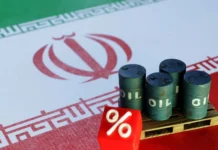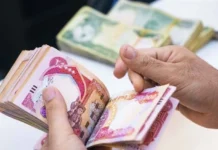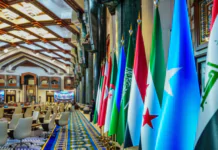Iraq Ranks Third In The Arab World In The Number Of Bank Cards.
July 26, 2025 Baghdad / Iraq Observer The Prime Minister’s financial advisor, Mazhar Mohammed Salih, confirmed on Saturday that digital transformation in financial transactions is an urgent need to address liquidity challenges, noting that Iraq ranks third in the Arab world in terms of the number of bank cards issued.
Saleh said, “Digital transformation in financial transactions has become an urgent need to address liquidity challenges, not just a technical upgrade,” noting that
“Iraq ranks third in the Arab world in terms of the number of bank cards issued, an indicator of the development of the financial sector and increased onfidence in government procedures.”
He explained that “the shift to electronic payments contributes to the introduction of liquidity into official channels and enhances transparency and financial oversight,”
calling for “overcoming challenges such as weak trust in banks, bureaucracy, and fear of oversight by developing infrastructure and providing incentives to citizens.”
https://observeriraq.net/العراق-يحتل-المرتبة-الثالثة-عربياً-بع/
Iraqi Plan To Extend A Network Of Pipelines To Export Oil And Gas
July 26, 2025 Baghdad/Iraq Observer The Ministry of Oil confirmed on Saturday that the contract to develop the Akkas gas field aims to increase production in the first phase to 100 million standard cubic meters. While noting that the implementing American company will train the ministry’s engineers in the latest technologies, the Ministry revealed a plan for an export pipeline from the Akkas field and the extension of a network of pipelines within Iraq to export oil and gas.
The Director General of the Central Oil Company, Mohammed Yassin, said,
“Under the contract signed on July 22, the American company Schlumberger will drill six wells in the Akkas gas field, with the aim of adding 100 million standard cubic feet to the current production of 45 million standard cubic feet, which is currently managed by national efforts.”
He added, “The time period agreed upon in the contract is one year, which is sufficient for the targeted phase,” expressing hope that the goal will be achieved in less than a year.
He continued, “The field’s maximum (peak) capacity is 400 million standard cubic feet, but this phase of the contract targets only 100 million, which is the first phase.”
He pointed out that “there is a plan to extend an export pipeline from the Akkas field to the Anbar complex station in Hit,” explaining that “the Ministry of Oil also has a plan to extend a network of branch pipelines within Iraq to export oil and gas.”
Yassin pointed out that “contracting with a reputable international company operating in approximately 85 countries will yield technical gains for Iraq, through training engineers on the latest technology.”
He emphasized that “there is training for our employees in the Central Oil Company and for new workers in the field.” He pointed out that “the Akkas field is part of a larger plan, as many contracts were signed, especially last year, and were activated on January 1, 2025.
The most prominent of these is the Mansouriya gas field in Diyala, where oil operations began on January 1, 2025, and are proceeding faster than planned.”
Regarding personnel, Yassin emphasized,
“We certainly agree with all foreign companies on the system and policy for employing Iraqi businesses.
In this field, the vast majority of workers will be Iraqi, with priority given to employing people from nearby areas, followed by those from more distant areas.”
https://observeriraq.net/خطة-عراقية-خطة-لمد-شبكة-أنابيب-متشعبة-ل/
Iraq’s Development Road To Include 6 Airports And 15 Industrial Cities
Business Iraq Jawad Al-Samarraie July 26, 2025
Development Road Project could be key player to Iraq sustainability
Baghdad (IraqiNews.com) – Iraq’s Ministry of Transport recently unveiled key outcomes from a pivotal meeting led by Prime Minister Mohammed Shia Al-Sudani regarding the ambitious Development Road project. Held last Wednesday, the session brought together the Minister of Transport, the head of the Supreme Committee for Coordination Between Governorates, and various directors-general, advisors, along with a representative from Oliver Wyman, the project’s economic consultant.
Maytham Al-Safi, Director of Relations and Media for the Ministry of Transport,
told the Iraqi News Agency (INA) that discussions around the Development Road project have been continuous.
These meetings have involved the Ministry of Transport, other relevant institutions, and both the Italian technical consultant (BTB) and the economic consultant, Oliver Wyman.
Delving into last Wednesday’s meeting, Al-Safi explained that the Prime Minister stressed a clear commitment to implementing directives, particularly concerning the formation of a committee.
This committee will be tasked with determining the final route between Iraq and Turkey, basing its decisions on technical and economic considerations.
Furthermore, the Prime Minister emphasized resolving all existing challenges within the project and adhering to its strict timelines.
The meeting also featured a presentation by Oliver Wyman on the project’s economic and financial model, according to Al-Safi.
This presentation, a culmination of previous discussions with the Ministry of Transport,
outlined the economic framework to be presented to the Prime Minister,
leading to its finalization and preparation for investment offerings.
Regarding the project’s current status, Al-Safi confirmed that the preliminary design phase has concluded, and significant progress has been made in the detailed design stage.
The Ministry aims to present the project to major international companies by the end of the current year.
The project will be strategically divided into sections to encourage competition among global firms,
ensuring their adherence to international standards for successful implementation.
Beyond Iraq’s borders, Al-Safi disclosed that several countries are already formal partners in the project, including
Turkey,
Qatar, and the
United Arab Emirates, via signed Memoranda of Understanding. Additionally,
another council has been formed, comprising
Turkey,
Hungary,
Serbia, and
Bulgaria,
representing the European dimension of the initiative.
Other nations also aspire to join the project, either in its execution or participation.
Al-Safi highlighted recent visits from economic representatives of various embassies in Baghdad to the Ministry of Transport and the Supreme Committee for the Development Road project,
including the Chinese economic advisor last year and the Australian and French ambassadors this year.
These discussions underscored widespread international interest in the project,
recognizing it as a global endeavor with implications beyond Iraq for the entire region and the world.
Ultimately, Al-Safi asserted that the Development Road project is poised to create thousands of job opportunities for Iraqis and fundamentally transform Iraq’s economic transportation landscape.
It is also expected to boost the national economic output, leading to comprehensive Iraqi economic integration, both domestically and internationally.
The project’s overarching policy aims for seamless connectivity across all sectors.
Al-Safi further clarified that the project will integrate three existing major airports— Baghdad, Basra, and Najaf— and willconnect to three new airports slated to enter service:Nasiriyah, Karbalaa, and the recently opened Mosul airport.
Moreover, the project will link to 15 industrial cities, emphasizing its role beyond mere transit. He concluded by stating that
the project is an integrated developmental initiative, benefiting connecting provinces by utilizing their raw materials and generating investment opportunities through local governments, institutions, and ministries. https://www.iraqinews.com/business/iraq-development-road-airports-industrial-cities/
Experts: Al-Sudani’s Field Visits Boost Development And Reduce Corruption
Economic 07/27/2025 Morning: Hussein Faleh Economists consider Prime Minister Mohammed Shia al-Sudani’s visits to the governorates and his direct monitoring of project implementation an important step toward accelerating service delivery that directly impacts citizens.
They assert that the government has succeeded in advancing development.
Economic expert, Alaa Al-Fahd, said in an interview with Al-Sabah: “Al-Sudani focused on paying attention to investment projects and service projects,because the government raised the slogan (government of services), noting that the previous stage witnessed the Prime Minister following up on projects in the field with the governors, as well as opening them and following up on implementation rates through field visits and departments.” Television. He added that
Competition between governorates
this has a direct impact on accelerating the pace of progress and stimulating competition between governorates to complete these projects, particularly with regard to service provision.
He explained that this has witnessed unprecedented success for the government through its presence on the ground and its genuine efforts to overcome the obstacles, problems, and challenges facing the implementation of these projects. Al-Fahd continued, saying that
development projects
the projects to relieve bottlenecks in Baghdad represent among the most prominent strategic projects that the government has directly supervised,
in addition to other projects in the governorates that are considered development projects,
as well as gas investment projects, stressing that
these field visits constitute a very important positive point and indicate the Prime Minister’s direct interest in the progress of implementing these projects, stressing that
these projects combined have contributed in a real way to pushing Wheel of development forward.
Project completion
For his part, economic researcher Abdul Salam Hassan told Al Sabah that
the Prime Minister’s visits to the governorates
and his direct supervision of project completion
are evidence of the government’s sophistication
and keen interest in the service projects citizens need. He added,
“We support the Prime Minister because these steps motivate local officials and encourage them to follow up on projects and complete them on time.”
He added, “These efforts must be accompanied by attention to the citizens, especially the poor and destitute segments in the governorates, as there are families who have no breadwinner, no salary, and no housing.”
He stressed the need to pay attention to these segments so that achievements are parallel to service and urban projects.
Field follow-up
Economic expert Nazir Al-Saadi told Al-Sabah: “The Prime Minister’s field monitoring and presence within the work arena carries many positives, as it enhances implementation capabilities and provides solutions to all challenges facing the project.
It also contributes to providing important observations that enhance implementation capabilities through encouragement and facilitation of completion requirements.”
He pointed out that the Prime Minister’s presence on the ground protects the country from the problems of delayed projects. He also ensures that the Prime Minister is fully aware of all projects, ensuring smooth implementation and protecting the country from the spectre of corruption that haunts the field of work. https://alsabaah.iq/118047-.html






